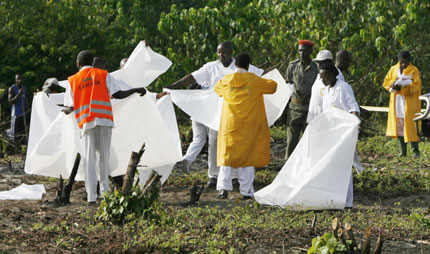All 114 aboard Kenya plane killed
Updated: 2007-05-07 20:02
Villagers wielding machetes and chain saws cleared the way Monday for searchers setting out into the central African swamp where the jetliner crashed Saturday.
"The plane fell head first. Its nose was buried in the mangrove swamp," Thomas Sobakam, chief of meteorology for the Douala airport, said earlier.
The plane had taken off from Douala, Cameroon's commercial capital, and its wreckage was found just 12 miles from the town's outskirts. The cause of the crash remained unclear.
The Nairobi, Kenya-bound plane was carrying 105 passengers and nine crew members from 27 different countries.
Among the passengers was Nairobi-based Associated Press correspondent Anthony Mitchell, who had been on assignment in the region.
Other passengers include executives from the South African cell phone giant MTN and the nephew of Indian tycoon Ramesh Chauhan, the owner of Parle Products, a leading manufacturer of cookies in India.
The wreckage was found southeast of Douala, along the plane's flight path from the Douala airport -- more than 40 hours after the Boeing 737-800 lost contact with the airport. The crash site was concealed by a thick canopy of trees, Titus Naikuni, chief executive of Kenya Airways, told a news conference in the Kenyan capital of Nairobi Sunday.
While the site where the plane went down was not remote, it was in a dense and hard-to-access mangrove forest. The road in was dirt track, its ruts filled with water Monday after heavy overnight rains. The last stretch to the site could accommodate only foot traffic -- a large Douala airport truck had become mired in the mud overnight.
A U.S. Embassy official who saw the crash site from a plane Monday said it would have been impossible to have found it from the air without coordinates provided by searchers on the ground. He said searchers in planes saw nothing when they flew over before sunset Sunday after hearing reports the plane could have gone down in the swamp.
"It's not what you expect, a bunch of trees knocked down and charred," said the official, who spoke on condition of anonymity because he was not authorized to speak to reporters. "It's just a big muddy hole, like many others out there."
The U.S. and France are among the nations providing aircraft and other equipment to help the Cameroonians search.
Guiffo Gande Adolphe, a 35-year-old Douala resident, said Monday he went to see what he could do after hearing wreckage had been found, and ended up among a handful of volunteers and soldiers who spent the night at the site. Adolphe said he had seen one body and a body part.
Flight 507 had departed from Douala airport early Saturday, an hour late because of rain. The plane issued a distress call, but then lost contact with the radio tower between 11 and 13 minutes after takeoff, officials said.
It was not immediately clear if the plane deviated at any point from its flight path.
The search initially focused on the thickly forested hills near the town of Lolodorf, about 90 miles southeast of Douala. Officials had been led to believe the plane had crashed in the vast, hard-to-access forest because of an incorrect satellite signal, possibly emitted from the plane, said Sobakam, the meteorology chief.
Fishermen living in the swampy mangroves near the Douala airport reported hearing a loud sound at the time of the crash.
"It was the fishermen ... who led us to the site," Sobakam said. "It's close enough that we could have seen it from the airport -- but apparently there was no smoke or fire."
Drenching rains also might have camouflaged the smoldering wreck in the nighttime hours immediately after the crash, officials said.
Officials said it was too early to tell what caused the plane to go down so quickly after takeoff.
"Whatever happened must have happened very fast, which is usually a sign of catastrophic structural failure," said Patrick Smith, a U.S. based-airline pilot and aviation expert.
"A plane never takes off into a thunderstorm, no crew or carrier would allow that," he said. "But it is remotely possible that the plane could have inadvertently gone into some extremely turbulent air and suffered massive hail damage or a sudden structural failure."
One of the many unanswered questions is why the plane stopped emitting signals after an initial distress call. The plane is equipped with an automatic device that should have kept up emissions for another two days.
An exhausted battery could be one reason, said Capt. Paul Mwangi, head of operations for Kenya Airways. "It is very unlikely, but the device can actually be destroyed. The impact would have to be very, very severe," he said Sunday.
Family members of passengers and crew gathered in Nairobi and Douala, many weeping.
"Oh my last born, my last born, where am I going to go?" Kezzia Musimbi Kadurenge, the mother of a missing crew member, said in Kenya. "I'm finished."
Kenya Airways is considered one of the safest airlines in Africa. The Douala-Nairobi flight runs several times a week, and is commonly used as an intermediary flight to Europe and the Middle East. The airline said most passengers were to transfer to ongoing flights in Nairobi.
Naikuni said the plane was only six months old.
The last crash of an international Kenya Airways flight was on Jan. 30, 2000, when Flight 431 was taking off from Abidjan, Ivory Coast, on its way to Nairobi. Investigators blamed a faulty alarm and pilot error for that crash, which killed 169 people.
|
||
|
||
|
|
|
|


